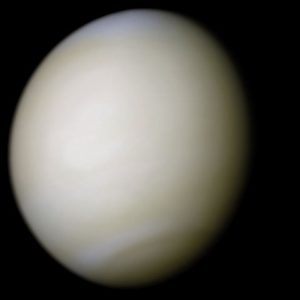
By Rajeswari Pillai Rajagopalan
ISRO recently announced its plans to undertake a mission to Venus in the early 2020s and has also invited international proposals for scientific payloads.
Since the successful inter-planetary mission to Mars in November 2014, India’s civil space organisation, the Indian Space Research Organisation (ISRO), has been aiming to do more such missions that would give the agency greater understanding of the solar system while highlighting India’s rising prowess in the outer space domain. The successful Mars mission has given a huge fillip as well as confidence to the Indian scientific community to explore other planets in its quest to gain greater proficiency in deep space communication and other advanced capabilities. During the Mars mission, the deep space communication assistance was provided by the NASA.
After Mars, Venus is considered as the next ideal inter-planetary mission for several reasons. One, Venus is considered as the “twin sister” of the Earth due to similarities in size, mass, bulk composition, density and gravity. Given its closer proximity to the Sun by 30 percent as compared to Earth, solar flux is higher on Venus. Venus is also hotter than Mercury even though Mercury is closer to the sun, due to its thicker atmosphere. Even so, there have been attempts to explore Venus from the 1960s onwards through flyby, orbiter, and even a few lander missions. Russia undertook a total of 16 Venus missions under Venera series between 1961 and 1983.
NASA also undertook several missions starting with its Mariner 2 orbiter in 1962. The last dedicated NASA mission to Venus was in 1990, mapping 98 percent of the Venus surface over four years. Emphasising the importance of these missions, Jim Green, director of NASA’s Planetary Space Division said recently that, “While Venus is known as our ‘sister planet,’ we have much to learn, including whether it may have once had oceans and harbored life. By understanding the processes at work at Venus and Mars, we will have a more complete picture about how terrestrial planets evolve over time and obtain insight into the Earth’s past, present and future.”
NASA and the Russian Academy of Sciences’ Space Research Institute (IKI) have also been in talks recently to undertake a collaborative mission to Venus to be launched sometime in the 2020s. One of the important objectives is to understand the climatic condition of Venus to know the causes of the rampant greenhouse effect in the planet today. The Venera-D mission will have an orbiter and a lander, and maybe even a solar-powered airship that would fly through Venus’ upper atmosphere. The U.S.-Russian collaboration is significant as till date, the Russian Venera spacecraft remains the only one to successfully land on Venus and survive its harsh conditions.
ISRO too appreciates the importance of studying Venus. ISRO’s plans to do a mission to Venus came up first in the budgetary allocations of the Department of Space for the year 2017-18.
ISRO recently announced its plans to undertake a mission to Venus in the early 2020s and has also invited international proposals for scientific payloads. In an “Announcement of Opportunity (AO),” the ISRO said, “there still exist gaps in our basic understanding about surface/sub-surface features and processes, super rotation of Venusian atmosphere and its evolution and interaction with solar radiation/solar wind.” The mission will have 12 scientific payloads aboard the satellite including a S-Band Synthetic Aperture Radar (SAR), Advanced Radar for Topside Ionosphere and subsurface sounding, Ultra Violet (UV) Imaging Spectroscopy Telescope, Thermal Camera, Cloud Monitoring Camera, Venus Atmospheric SpectroPolarimeter Airglow photometer and Mass Spectrometer. ISRO’s plans for Venus is not entirely new. Last year, ISRO had called for space-based experiment proposals from scientists within India. In an earlier AO last year, it said the proposals are invited from those institutions in India that are engaged in planetary exploration studies, development of science instruments for space or willing to develop those experiments.
Traditionally, India did not focus on human space or inter-planetary missions. As the father of the Indian space programme Dr. Vikram Sarabhai and India’s first Prime Minister Jawaharlal Nehru noted, India’s space programme is geared to uplift the lives of its people by focusing on the economic and developmental applications of space programme. Five decades later, as India’s space programme advances, there is a natural progression which has seen a change of tack in its overall orientation. So, in many sense, India’s Mars mission and now the plans for the Venus mission are to be seen as a natural progression for ISRO. These missions will give India and ISRO greater visibility highlighting the agency’s ability to undertake complex and credible missions in an economically competitive manner. This has implications as India enters the global commercial space market as a competitive player able to offer cost-effective launches for new and upcoming players from across the developing world who have similar aspirations as India.
However, ISRO needs to get more innovative about the policy landscape and provide opportunity also to the private sector so that ISRO can focus on larger, common-interest areas such as space exploration which the private sector is unlikely to pursue. Ideally, the private sector should be given a level playing field on the commercial side, with the ISRO playing the role of a facilitator and focusing on more scientifically important areas such as national security, which the private sector will not be suitable for. At the very least, many of the tried and tested programmes such as the Polar Satellite Launch Vehicle (PSLV) should be handed over to the private players in a time-bound manner. That said, the ISRO’s Venus plans demonstrate the continued and steady growth and maturation of India’s space capabilities that is rightly a matter of pride for both ISRO and India.

Dr. Rajeswari Pillai Rajagopalan is a Distinguished Fellow and Head of the Nuclear and Space Policy Initiative at the Observer Research Foundation in New Delhi, India. The views expressed in this essay are those of the author alone.
This essay was first published in the Financial Express, and is republished here with the kind permission of the editors and the author.





